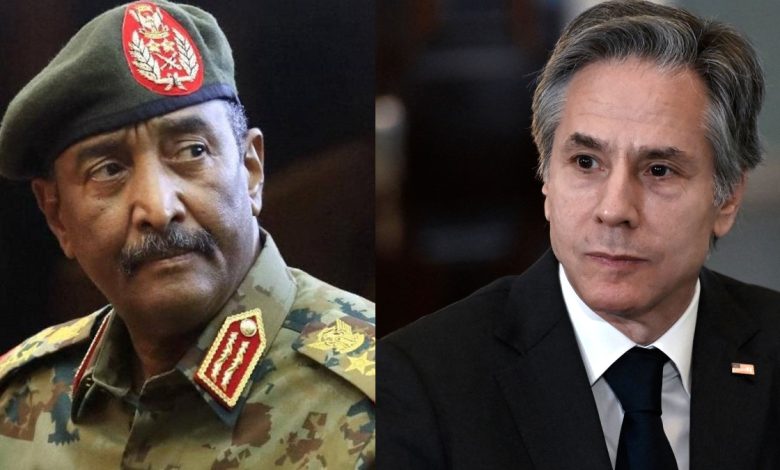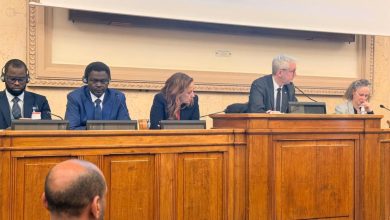Reports
Washington’s Failure to Bring the Sudanese Government to the Geneva Negotiations

Al-Noor Ahmad Al-Noor
The Sudanese government and military leadership have ignored American pressure to participate in the Swiss Geneva negotiations with the Rapid Support Forces, which began a week ago. Observers believe that the non-response to pressure stems from the government’s belief that it is in a better political and military position.
At the end of last July, the U.S. administration invited the conflicting parties in Sudan to a new round of negotiations in Geneva to end the ongoing war since April 15, 2023.
The Geneva talks, involving regional and international partners, commenced last Wednesday, aiming to “reach an agreement to stop violence in Sudan and enable the delivery of humanitarian aid to all those in need.”
The Sudanese government clung to its refusal to participate in the negotiations until the “Jeddah Declaration” signed between the army and the Rapid Support Forces in May 2023 was implemented, while the leader of the Rapid Support Forces, Mohamed Hamdan Dagalo, accepted the invitation and sent his delegation to Switzerland.
As the talks began, U.S. Secretary of State Antony Blinken called the head of the Sovereignty Council and army commander Abdel Fattah al-Burhan to urge him to join the talks, but the government set conditions for participation that include implementing the “Jeddah Declaration” and not expanding the mediators and observers in the talks.
After reaching an agreement between the government and mediators, the government sent a delegation to Jeddah headed by the Minister of Minerals, Mohamed Basher Abu Numo, where he held consultations with the American side, but the two parties failed to agree on meeting the government’s conditions for participating in the Geneva negotiations.
Then Blinken reinitiated phone contact with al-Burhan, who requested new consultations with the American-Saudi mediation to discuss the government’s vision regarding the implementation of the “Jeddah Declaration.”
Blinken preempted the new consultations in Cairo, which will officially begin today, Wednesday, by holding talks with the Egyptian President Abdel Fattah el-Sisi, his Foreign Minister, and the Director of Intelligence, to “soften” the Sudanese leadership’s stance after the Sovereignty Council adopted the government’s vision to implement the “Jeddah Declaration” on Tuesday, according to sources close to the council who spoke to Al Jazeera Net.
The sources, who requested anonymity, said the government’s vision is comprehensive, specifying the locations where the Rapid Support Forces would gather after withdrawing from civilian homes and properties, a timeline for this step, and the formation of an international monitoring mechanism and the countries involved in it.
Representatives of the army and Rapid Support Forces with other officials after signing an agreement to stop the ceasefire in Jeddah last year (Reuters)
No Consequences for Absence
Vice President of the Sovereignty Council Malik Agar stated on Tuesday that the war against the “Rapid Support Forces militia is nearing its end, and the indicators are clear, and within a month, all roads occupied by them will be opened.”
He mentioned that the government entered into a frank dialogue with the United States about the Geneva negotiations “and rejected their impositions and conditions, and we will send a delegation to meet them in Cairo and then consider the next step.”
Al-Burhan clarified, during a meeting with journalists in Port Sudan last Saturday attended by a correspondent from Al Jazeera Net, that the “Jeddah Declaration” obliges the Rapid Support Forces to withdraw from the homes of citizens and civilian properties in the states of Khartoum, Gezira, Sennar, and Darfur, and “there is no going back on that, and if they refuse, we will continue fighting them to force them out,” according to his statement.
Cameron Hudson, a fellow at the Center for Strategic and International Studies in Washington, attributes the absence of the army’s delegation from the Geneva negotiations to the lack of consequences and repercussions for this absence.
In a radio interview, Hudson believes that if there is pressure exerted on the countries supporting both sides of the conflict in Sudan, these countries could press the parties to attend the negotiations.
Hudson thinks that al-Burhan’s standpoint is “reasonable,” stating that there is much the United States can do to persuade him to attend the negotiations.
Domestic and External Pressures
Editor-in-chief of “Al-Tayar” newspaper and writer Osman Mirghani says the government conditions the implementation of the “Jeddah Declaration,” and the mediation provided commitments and guarantees for its execution, but the government insists on its implementation first, not just the promise of it.
Mirghani added to Al Jazeera Net that the government’s non-response to American pressure is due to political pressures from some parties close to it, which limits its ability to make decisions.
Political researcher Faisal Abdel Karim believes the government is adamant about not backing down from its position regarding the implementation of the “Jeddah Declaration” before moving on to discuss security and military arrangements with the Rapid Support Forces despite the pressures it faces for reasons related to the citizens and the military establishment.
Abdel Karim stated to Al Jazeera Net that any agreement reached by the government before the Rapid Support Forces withdraw from the homes of citizens would not be acceptable to the people and would undermine the military and political leadership’s popular support, as the military establishment is not prepared to accept any settlement with the Rapid Support Forces that grants them a military and political role in the future.
He added that the government and military leadership recently found support from regional powers and turned eastward, feeling that they are in a better diplomatic and military position, and that given the contradictions and conflicting interests of regional and international powers, they are safe from any international sanctions.
According to the political researcher, there is nothing that compels the Sudanese government to make concessions or grant the Democratic administration in the White House a political achievement without a price before the American election



